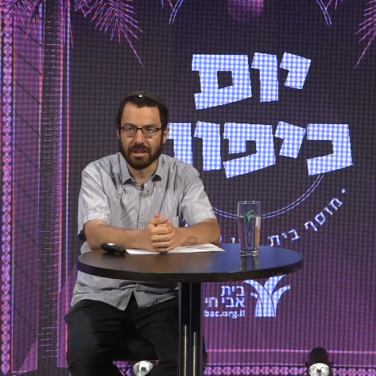Back to the Bible
Ariel Seri-Levy
 rozum- Envato Elements
rozum- Envato Elements
Ariel Seri-Levy reviews the various meanings of forgiveness
A person walks down the street, lost in thought, when suddenly he hears another person’s voice. “Excuse me, what’s the time?” The person looks at his watch, says the answer, and resumes his walk. Why did the stranger ask him to be excused, or forgiven? For what? Did the stranger regret his actions? Had he offended anyone? What about the person with the watch? Was he offended? Did he really excuse, or forgive, or was just it an empty phrase, devoid of meaning and substance? Is there any connection between this kind of random request to be excused or forgiven and true atonement – the heartfelt pleas for forgiveness he has made or been asked for throughout his life?
To try and understand the meaning of this request, which seems merely to be lip service, and to examine its relationship with the other kind of forgiveness – which is usually treated with more meaning and importance – let’s look at some biblical texts. Although the root salach (at the base of the word “slicha”, which means “forgiveness”) is attributed only to God in the Bible, God may be the most human of biblical characters, so perhaps we may learn something about forgiveness between humans.
We can identify two opposing perceptions of forgiveness in the bible. The first and more common of the two is reflected in many texts from a variety of genres, streams, and periods in time. Its paradigm can be seen in a prayer said by King Solomon, as related in the Book of Kings, upon construction of the Temple: “When your people Israel have been defeated by an enemy because they have sinned against you, and when they turn back to you and give praise to your name, praying and making supplication to you in this temple, then hear from heaven and forgive the sin of your people Israel and bring them back to the land you gave to their ancestors.” (Kings 1, Chapter 8, 33-34).
The series of events depicted begins with a human sin, leading to a divine punishment. The punishment leads to a renewed appeal to God, who listens, and forgives, cancelling the punishment. We can easily apply this chain of events to forgiveness between humans: a person offends his peer, the person offended quickly clarifies the situation – sometimes through a facial expression or with harsh words, sometimes actions; the offender regrets his words and asks for forgiveness, and things are returned to their original state.
Is an application a request?
According to the concept of spontaneous forgiveness, in order to earn forgiveness, you must ask for it (as we will later see, this is no trivial feat). In Biblical literature, there are stylistic elements common to the appeal to a human master and the appeal to God – for example the expression, “Bi, Adoni” (“Please, sir”). Later on the distinction was made between Adoni (sir) and Adonay (my Lord). Another example is referring to oneself as “avdecha” (your servant) when appealing for forgiveness.
In respect of forgiveness, it’s especially important to note two characteristics of prayer which apply to any kind of request. The first is the spontaneity of the applicant: when we are required to file an “application” for something, it’s hard to define it as a request. We expect the request to come of the person’s own free will, to be phrased individually, in his own words, and refer to the specific circumstances of his case.
The second and more important characteristic is the option to refuse. An offer that cannot be refused is not an offer – it’s a command. When I ask another person for something, by asking I am admitting he is not obligated to fulfill my request. If he decides not to, it may be hurtful and offensive, but at least formally, it’s legitimate.
These two characteristics are valid when it comes to forgiveness in the bible. We cannot find two identical prayers, as each refers specifically to its own circumstances, reflecting the person’s personality and views, and there are transgressors who do not request forgiveness at all. The second characteristic of the request can be found in relation to forgiveness: sometimes God refuses to forgive.
In the Book of Lamentations, for instance, it is written: “We have transgressed and have rebelled; Thou have not pardoned. Thou hast covered with anger and pursued us; Thou has slain unsparingly. Thou hast covered Thyself with a cloud, so that no prayer can pass through.” (Chapter 3, 42-44). These verses describe the mechanism we saw in Solomon’s prayer, but without its final stages. The prayer was rejected: God hides behind a cloud so that the prayers will not reach him, like a wounded person withdraws and refuses to listen to any attempts to appease him.
If we go back to the watch incident with which we opened, it’s hard to find any connection between that request “to be excused” and the Biblical descriptions of forgiveness we’ve seen here. The person who asks for the time has not committed any offense against the person with the watch, the latter has not been hurt, and will certainly not punish him. Moreover, the request for forgiveness comes before the deed in itself, which is curious: if a man thinks asking another man for the time is a bad deed worthy of asking for forgiveness, why does he do it? If he decides to do it, why ask for forgiveness? Besides, it doesn’t seem like the person with the watch has the option of refusing. Though he is not legally obliged to provide the time of day, his refusal to do so would undoubtedly be interpreted as rudeness, or at least strange behavior.
The explanation for the “Excuse me, what’s the time?” phenomenon
Perhaps the explanation of this phenomenon may be found in an alternative biblical concept of divine forgiveness. This concept is reflected in certain parts of the bible, which are customarily assumed to originate in the circles of clergy. The concept of Slicha Kohanit, (forgiveness by the priests, or kohanim), which we shall call “mechanical forgiveness”, is expressed in the rules related to sacrifices of guilt and sin in the books of Leviticus and Deuteronomy. Here, for instance, is a rule dealing with an accidental sin committed by a leader:
“When a ruler sinneth, and doeth unwittingly any one of all the things which Jehovah his God hath commanded not to be done, and is guilty; if his sin, wherein he hath sinned, be made known to him, he shall bring for his oblation a goat, a male without blemish. And he shall lay his hand upon the head of the goat, and kill it in the place where they kill the burnt-offering before Jehovah: it is a sin-offering. And the priest shall take of the blood of the sin-offering with his finger, and put it upon the horns of the altar of burnt-offering; and the blood thereof shall he pour out at the base of the altar of burnt-offering. And all the fat thereof shall he burn upon the altar, as the fat of the sacrifice of peace-offerings; and the priest shall make atonement for him as concerning his sin, and he shall be forgiven.” (Leviticus chapter 4, 22-26).
The leader’s sin was accidental. He does not ask for forgiveness, rather he brings a sacrifice to the temple. After a series of pre-determined actions, performed by the person and the Kohen, the result is “the priest shall make atonement for him as concerning his sin, and he shall be forgiven.” We will later deal with the meaning of atonement, but for now let’s focus on forgiveness. Both the substantial characteristics we found in the concept of spontaneous forgiveness between man and God, which we will also probably find between man and his peer, do not exist in this law: neither the appellant nor the respondent are spontaneous.
The sinner does not choose to ask for forgiveness; he is obligated to do so. We do not know if he regrets his deeds or feels guilty; he must feel some sense of obligation, as the law assumes that he will execute the law willingly. But more precisely, the sinner is not required to request forgiveness, but rather to carry out certain deeds that will lead to forgiveness. The sinner does not say a word. And unlike a request for forgiveness, which may be phrased in different ways, the actions of a sinner who makes a sacrifice are pre-determined, without any choice on his part.
Just like there is nobody asking for forgiveness here, there is also no one who forgives. The law notes the result of the ritual in a passive voice: “be forgiven”. The sin was “one of all the things which Jehovah his God hath commanded not to be done”, and the ritual is performed “before Jehovah”, in the temple – but beyond these, there is no further mention of God in the law, and God is not involved in the process. Forgiveness – or rather, being forgiven, is the automatic result of the series of actions performed. In most Biblical descriptions of forgiveness, which reflect the concept of spontaneous forgiveness, writers connect divine forgiveness to the grave of God, his mercy and benevolence. In comparison, in the priest’s law we see no explanation for forgiveness, and it has no emotional or personal weight. It’s a self-occurring anonymous forgiveness.
The theological background for the concept of mechanical forgiveness is foreign to most readers of this article, and therefore should be described in brief. The key concept of priesthood in the bible is that God resides in the Temple, and through his presence in the Temple, He is presence among the people. Thus says God to Moses at Mount Sinai: “And let them make me a sanctuary, that I may dwell among them” (Exodus, 25, 8). Certain actions specified in the priest’s constitution in the bible – some related to sins and others related to bodily secretions or life events such as menstrual blood, birth or death – defile the sanctity of the Temple and jeopardize the continued presence of God among the people. Therefore, purification rites are needed, to correct the damages and purify the temple.
The verb describing the cleaning of the sacred from sin and contamination is kipper. In the ancient Akkadian language, the meaning of this root is to clean, to wipe. It is, of course, related to Yom Kippur, as we will soon see. However, the sin not only damages the Temple, but also the sinner. As a metaphysical object, the sin exists and must be removed from the sinner. The verb describing the removal of the sin from the sinner is salach (forgive). The meaning of this verb in Akkadian is related to water or bathing, and as we can see the image at the source of these verbs is that sins are perceived as dirt, and forgiveness is the bathing which cleans the person of the dirt of his sins.
The laws of the Kohanim allow, or more accurately require, the chain of actions leading to forgiveness, only in cases of minor transgressions which are usually accidental. Sins that are done “defiantly” (Book of Numbers, Chapter 15, 30), meaning maliciously, are not worthy of forgiveness under this perception. As we have seen, forgivable sins are forgiven automatically, without any direct involvement of God. The extent of God’s involvement is in that He has apparently determined how things will occur, and has commanded how to behave in each case.
An uprooted social order
The perception of mechanical forgiveness is therefore based on serious theological assumptions that may seem irrelevant to contemporary readers. However, there is still some similarity between that mechanical forgiveness, with its lack of emotion and automatic nature, and the type of forgiveness with which we began: “Excuse me, what’s the time?”
To understand how, let’s imagine a situation in which a stranger approaches us and asks for something without first saying, “Excuse me”, or say a person steps on your foot on the bus, and notices it, but does not ask for forgiveness. There’s something outrageous about it. In our society, talking to strangers or stepping on their feet is considered inappropriate. It’s justified in certain circumstances, but when we do these things, we have to clarify that they are extraordinary. One should make a declaration like the following: “Although it’s not customary to talk to strangers, don’t worry, I’m not trying to uproot any social order but for one minute, and order will be restored immediately thereafter”. This declaration is packed into those two words: “excuse me.”
That type of request for forgiveness receives an immediate response. It has to be automatic and devoid of emotion on both sides. In fact, the person who asked for the time did not ask for forgiveness, he said “forgive me”. He could just as well have raised his hand (as is customary between drivers, for instance). Therefore, he can say the words before the action or simultaneously, and he does not expect a response or wait for approval. There is no complicated interpersonal process here, just a form of ritual.
Let’s imagine the following: “Sir, please excuse me, forgive me, I beg you to absolve me, for I am full of shame, but perhaps you can tell me, what time is it?” And now let’s consider the response: “I have weighed your request overnight, and now feel appeased and calm. I have overcome my offense, and am now pleased to tell you the time is ten o’clock.”
That would be a strange conversation. These delays are redundant and even disturbing, as the matter at hand is not any hurt emotions, but a social order that has been upturned. That social order is no small thing, as it organizes our thoughts and feelings. The forgiveness described in the priests’ texts does not relate to the social order but rather to the cosmic order, to the very existence of the world. There are transgressions that are not serious in themselves, and they were accidental, but they must not be overlooked. It is mandatory to execute the proper procedures and not divert from them, in order to gain forgiveness and restore the natural order.
Cleaning the temple, not the person
What about Yom Kippur? To which kind of forgiveness does it belong? Many of us would like to think of it as spontaneous forgiveness, which entails a deep reconciliation between conflicted hearts. In the Bible, at least, there is no trace of this. It’s the Day of Atonement, not the Day of Forgiveness, and atonement, as we have seen – means cleaning all the sacred elements of their contamination and sin, in order to ensure the continued presence of God in the temple: “and he shall make atonement for the holy place, because of the uncleanness of the children of Israel, and because of their transgressions, even all their sins: and so shall he do for the tent of meeting, that dwelleth with them in the midst of their uncleanness” (Leviticus, 16, 16). The purpose of the Biblical Yom Kippur is to clean the Temple, not the person, and therefore there is no mention of forgiveness. And if divine forgiveness is not mentioned – needless to say, forgiveness between man and his peers is not there, and it has nothing to do with the Biblical Yom Kippur.
In a process that was fascinatingly profound, and cannot be expounded upon in this article, the Sages have turned Yom Kippur into a day of personal and social correction (which is the climax of the “Ten Days of Repentance”, which are also absent from the Bible). They determined that Yom Kippur does not atone for offending another person, “until his friend is appeased”, and thus they completed the procedure in which spontaneous forgiveness has taken the place of mechanical forgiveness.
However, one cannot ignore the presence of the mechanical forgiveness perception even in our modern Yom Kippur. The mechanical nature is expressed first and foremost in the fact that forgiveness has a specific date on a calendar. If the request for forgiveness comes from the heart and is meant to penetrate the heart – what does it have to do with the date?
It seems that a fixed date exposes the fact that any request for forgiveness, profound and honest as it may be, will always occur within a social context and under clear rules. Ultimately, the gap between spontaneous and mechanical forgiveness is not so great. We have seen that the mechanical forgiveness in the Bible carries many profound assumptions about God, man, and the Temple. In an interpersonal context, it expresses rules that determine proper behavior, and which irregular behaviors may be reasonably tolerated (for example, the rules allow us to accidentally fall upon another person in a crowded bus, but they also dictate that we must ask for forgiveness, and they do not allow us to jump on anyone intentionally).
On the other hand, spontaneous forgiveness also has some mechanical characteristics. It has a set date, and there are customary ways for asking and receiving forgiveness. In his regulations of repentance, the Rambam tried to further institutionalize these rules, but they exist, unwritten, in any society.
Yom Kippur, the Day of Atonement, which has become the Day of Forgiveness over the years, is a ritual that repeats itself almost identically every year. Requests for forgiveness are also rituals. In certain contexts, they are nothing more than ceremonies, i.e. a series of predetermined actions that do not require emotional involvement or personal judgment. But this does not render the request for forgiveness – whether from God against whom we have sinned or from the person we have offended – meaningless. In a way that is miraculous, almost magical, it has the power to remove the influence of the offensive deed and restore the situation to its previous state. In that respect, forgiveness is one of the ways to correct the world.

Envato Elements - By mkos83






